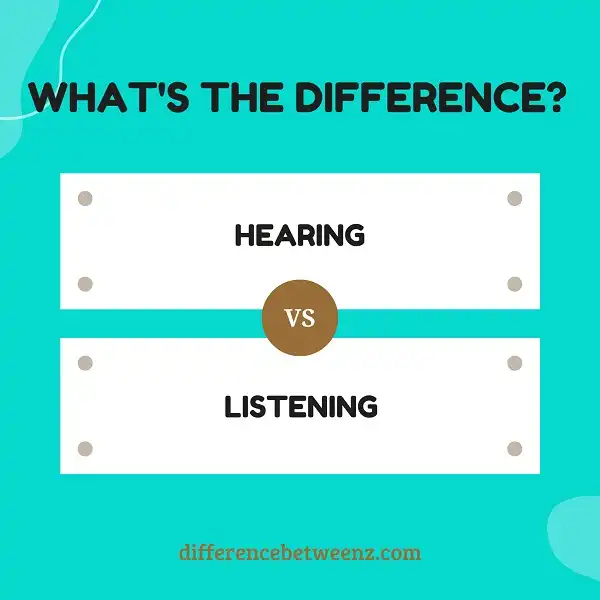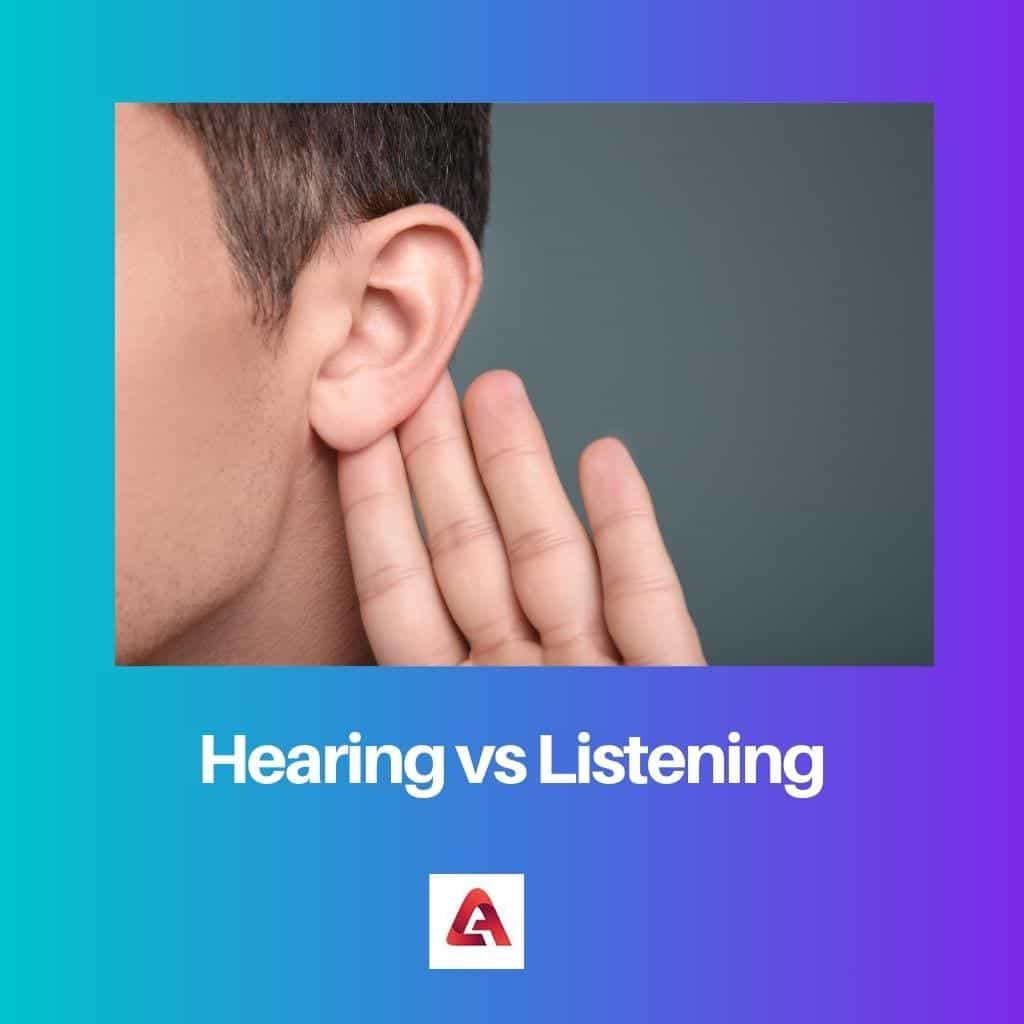Understanding the difference between hearing and listening is crucial for effective communication and personal development. While these terms are often used interchangeably, they carry distinct meanings that significantly impact how we interact with the world around us. By exploring their nuances, we can enhance our communication skills and build stronger connections with others.
Hearing is a passive process where sound waves enter our ears and are processed by the brain. It's an automatic response that doesn't require active engagement. On the other hand, listening is an active and intentional process that involves paying attention, interpreting, and responding to sound. This distinction plays a vital role in both personal and professional relationships.
In this article, we will delve into the differences between hearing and listening, explore their importance, and provide practical tips for improving your listening skills. By the end of this guide, you will have a deeper understanding of how to become a more effective communicator and listener.
Read also:Dallas House Of Blues A Unique Live Music Experience
Table of Contents
- Hearing as a Biological Process
- Listening as an Active Process
- Key Differences Between Hearing and Listening
- The Importance of Active Listening
- Developing Effective Listening Skills
- Impact on Communication
- Common Barriers to Effective Listening
- Benefits of Being a Good Listener
- Practical Tips for Better Listening
- Conclusion
Hearing as a Biological Process
Hearing is a natural, biological function that occurs when sound waves travel through the ear canal and are processed by the auditory system. This process involves several intricate steps, starting with the outer ear capturing sound waves, which are then transferred to the middle ear and inner ear. The cochlea, a small, snail-shaped structure in the inner ear, converts these sound waves into electrical signals that the brain can interpret.
According to the National Center for Biotechnology Information, the human ear can detect sounds within a frequency range of 20 Hz to 20,000 Hz. However, hearing alone does not guarantee comprehension or engagement with the sounds we perceive. It is merely the first step in the auditory experience.
Listening as an Active Process
Listening, unlike hearing, requires conscious effort and attention. It involves not only perceiving sounds but also understanding, interpreting, and responding to them. Effective listening goes beyond simply hearing words; it encompasses emotional intelligence, empathy, and critical thinking.
Research conducted by the American Psychological Association highlights that active listening fosters deeper connections and improves interpersonal relationships. By focusing on the speaker's message, listeners can better grasp the underlying emotions and intentions behind the words being spoken.
Key Differences Between Hearing and Listening
The distinction between hearing and listening lies in their nature and purpose. Hearing is a passive activity that occurs automatically, while listening is an intentional act that demands focus and engagement. Below are the primary differences:
- Passive vs. Active: Hearing happens involuntarily, whereas listening requires deliberate effort.
- Comprehension: Hearing does not involve understanding, whereas listening entails interpreting and processing information.
- Emotional Engagement: Listening often includes an emotional component, such as empathy or curiosity, which is absent in mere hearing.
The Importance of Active Listening
Active listening is essential for effective communication and relationship-building. It helps individuals better understand others' perspectives, resolve conflicts, and foster trust. In professional settings, active listening can lead to improved teamwork, increased productivity, and better decision-making.
Read also:Discover The Role And Services Of Consulat New York
A study published in the Frontiers in Psychology journal found that organizations with employees who practice active listening experience higher levels of employee satisfaction and retention. This highlights the critical role of listening in both personal and professional contexts.
Developing Effective Listening Skills
To become a better listener, one must cultivate specific skills and habits. Below are some strategies for improving your listening abilities:
Practicing Empathy in Listening
Empathy involves understanding and sharing the feelings of others. When listening empathetically, you focus on the speaker's emotions and experiences rather than solely on the words being spoken. This approach builds trust and encourages open communication.
According to the Greater Good Science Center at the University of California, Berkeley, practicing empathy can enhance interpersonal relationships and reduce conflict. By putting yourself in someone else's shoes, you can better grasp their perspective and respond appropriately.
Understanding Non-Verbal Cues
Non-verbal communication, such as body language, facial expressions, and tone of voice, plays a significant role in effective listening. Paying attention to these cues can provide additional context and meaning to the spoken word.
Research from the Taylor & Francis Online suggests that up to 93% of communication is non-verbal. Therefore, being mindful of non-verbal signals can greatly enhance your listening skills and overall communication effectiveness.
Impact on Communication
The difference between hearing and listening has a profound impact on communication. While hearing allows us to perceive sounds, listening enables us to engage meaningfully with others. Poor listening habits, such as interrupting or zoning out, can lead to misunderstandings and strained relationships.
Effective communication relies on active listening, which fosters clarity, mutual respect, and collaboration. By prioritizing listening over mere hearing, individuals can create more meaningful interactions and achieve better outcomes in both personal and professional settings.
Common Barriers to Effective Listening
Despite its importance, many people struggle with effective listening due to various barriers. Below are some common obstacles and how to overcome them:
Distractions and Multitasking
In today's fast-paced world, distractions are everywhere. From smartphones to social media, numerous factors can divert our attention from the present moment. To combat this, practice mindfulness and set boundaries to minimize interruptions during conversations.
Cognitive Bias
Cognitive biases, such as confirmation bias or stereotyping, can hinder our ability to listen objectively. These mental shortcuts cause us to filter information based on preconceived notions rather than fully engaging with the speaker's message. Developing self-awareness and challenging assumptions can help overcome these biases and improve listening skills.
Benefits of Being a Good Listener
Becoming a good listener offers numerous advantages, including:
- Improved relationships and social connections.
- Increased understanding and empathy for others.
- Better problem-solving and decision-making abilities.
- Enhanced professional success and career advancement.
By investing time and effort into honing your listening skills, you can reap these benefits and more, leading to a more fulfilling and connected life.
Practical Tips for Better Listening
Here are some actionable tips for improving your listening skills:
- Eliminate distractions by turning off electronic devices during conversations.
- Maintain eye contact and use positive body language to show engagement.
- Practice paraphrasing and summarizing to ensure understanding.
- Ask open-ended questions to encourage deeper discussion.
Implementing these strategies can help you become a more effective listener and communicator.
Conclusion
In conclusion, understanding the difference between hearing and listening is vital for effective communication and personal growth. While hearing is a passive process, listening is an active skill that requires focus, empathy, and intentionality. By developing strong listening skills, you can enhance your relationships, improve your professional performance, and create a more meaningful and connected life.
We encourage you to apply the tips and strategies outlined in this article to become a better listener. Share your thoughts and experiences in the comments below, and don't forget to explore other articles on our website for more insights into communication and personal development.


